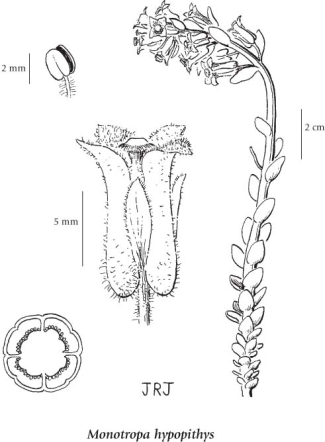Hypopitys monotropa
pinesap
Monotropaceae
Introduction to Vascular Plants
pinesap
Monotropaceae
Introduction to Vascular Plants
Species Information
General:
Perennial herb from a fleshy root mass; parasites on mycorrhizal fungi associated with trees; "stems" erect, simple, 5-30 cm tall, pinkish to straw-coloured, drying to black; persistent after seed dispersal; without chlorophyll.
Leaves:
Mostly near bottom of stem, scale-like, lanceolate to linear-lanceolate, thick, margins entire or fringed with coarse hairs.
Flowers:
Several to many in terminal, raceme-like inflorescence, usually bent over when flowering, becoming erect in fruit; flower stalks 3-6 mm long; petals 10-14 mm long, erect, overlapping one another, usually hairy on one or both surfaces, sometimes glabrous, somewhat pouch-like at base; calyces 4-9 mm long, margins of lobes hairy; stamens shorter than the corolla; styles 1-2 mm wide, hairy; stigmas slightly lobed.
Fruits:
Capsules, nearly globe-shaped, 5-10 mm long.
Notes:
Stem and leaves can be considered part of the inflorescence.
Illustration

If more than one illustration is available for a species (e.g., separate illustrations were provided for two subspecies) then links to the separate images will be provided below. Note that individual subspecies or varietal illustrations are not always available.
Illustration Source: The Illustrated Flora of British Columbia
Habitat and Range
Mesic forests in the montane zone; frequent in SW BC, infrequent in SC BC and northward to 57æN; circumboreal, N to SE AK, E to NF, and S to CA, MX, and FL; Europe.Status Information
Synonyms
Synonyms and Alternate Names:
Monotropa hypopithys L.
Taxonomic Keys
1. Plants pinkish to straw-coloured; inflorescence of several to many flowers in terminal clusters; petals 4, 10-14 mm long; sepals 4...........................M. hypopithys
1. Plants waxy-white; inflorescence of a single terminal flower; petals usually 5, 15-20 mm long; sepals lacking but upper bracts sepal-like...........................M. uniflora Source: Illustrated Flora of British Columbia |